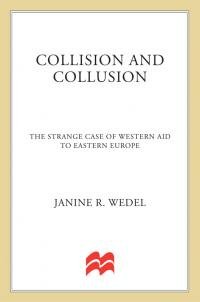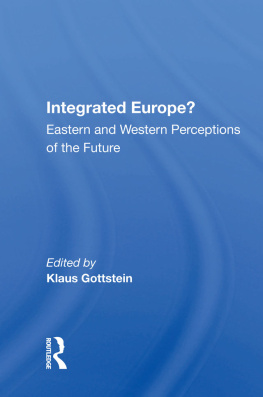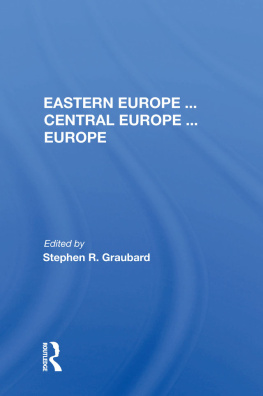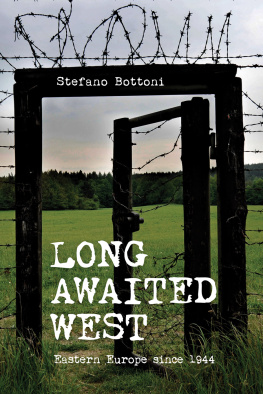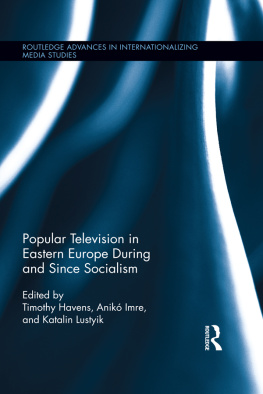FAMILIES WITH SMALL CHILDREN IN EASTERN AND WESTERN EUROPE
Families with Small Children in Eastern and Western Europe
Edited by
Ulla Bjrnberg
Jrgen Sass
First published 1997 by Ashgate Publishing
Reissued 2018 by Routledge
2 Park Square, Milton Park, Abingdon, Oxon, OX14 4RN
711 Third Avenue, New York, NY 10017, USA
Routledge is an imprint of the Taylor & Francis Group, an informa business
Copyright Ulla Bjrnberg, Jrgen Sass 1997
All rights reserved. No part of this book may be reprinted or reproduced or utilised in any form or by any electronic, mechanical, or other means, now known or hereafter invented, including photocopying and recording, or in any information storage or retrieval system, without permission in writing from the publishers.
Notice:
Product or corporate names may be trademarks or registered trademarks, and are used only for identification and explanation without intent to infringe.
Publisher's Note
The publisher has gone to great lengths to ensure the quality of this reprint but points out that some imperfections in the original copies may be apparent.
Disclaimer
The publisher has made every effort to trace copyright holders and welcomes correspondence from those they have been unable to contact.
A Library of Congress record exists under LC control number: 97073379
ISBN 13: 978-1-138-31060-5 (hbk)
ISBN 13: 978-1-138-31062-9 (pbk)
ISBN 13: 978-0-429-45931-3 (ebk)
Marina Arutiunyan
Institute for Socio-Economic Studies of Population, Centre for Gender Studies, Russian Academy of Science, Moscow, Russia
Barbara Bertram
German Youth Institute, Leipzig, Germany
Ulla Bjrnberg
Department of Sociology, University of Gteborg, Sweden
Gisela Anna Erler
German Youth Institute, Mnchen, Germany
Grazyna Firlit-Fesnak
Institute for Social Policy, University of Warsaw, Poland
Monika Jaeckel
German Youth Institute, Mnchen, Germany
Sima Nieborg
Verwey-Jonker Institute, Utrecht, Netherlands
Jrgen Sass
German Youth Institute, Mnchen, Germany
Olga Zdravomyslova
Institute for Socio-Economic Studies of Population, Centre for Gender Studies, Russian Academy of Science, Moscow, Russia
This book reports about international co-operative research on family policy and family development in Eastern and Western Europe. The project was initiated by a team of researchers from the German Youth Institute (Deutsches Jugendinstitut). During the period of investigations several workshops took place to debate the findings of the survey (in Gteborg, Moscow, Munich, Paris, Utrecht, Warsaw). The workshops and the survey in East and West Germany, Poland, Russia and Hungary have been financed by the Federal Ministry for Family, Senior Citizens, Women and Youth (Bundesministerium fur Familie, Senioren, Frauen und Jugend), Bonn. The Swedish study has been financed by the Council for Research in the Humanities and Social Sciences and by the Council for Social Research.
Further co-operation partners of the study: Marietta Pongracz, Demographic Research Institute, Budapest (She was responsible for the survey in Hungary); Jeanne Fagnani, CNAF, Paris.
We are grateful for all moral and financial support from all institutions mentioned. We are also grateful to all family members who offered us their time and their stories about their every day life as families.
Ulla Bjrnberg , Jrgen Sass
Background of the study
This book presents results from an international study on family policy and family development in Eastern and Western Europe. At the time when the study was conceived, the political and social transformations which were to take place in Eastern Europe in the beginning of the 1990s could hardly have been predicted. The original aim of the project was to compare the expectations and problem awareness of families with small children under the conditions of different socialist societies (GDR, Poland, Soviet Union and Hungary) with those of Western Europe (West Germany, Sweden and the Netherlands). Our aim was to focus particularly on the way in which family policy measures relating to reconciliation of work and family were viewed and used by employed parents with small children. We also wanted to consider how compatibility between family and employment was perceived by the parents.
As a result of the political developments, the actual collection of data fell at a time (1991-1992) when a process of social and economic restructuring on an unprecedented scale was taking place - also in Western Europe. On the one hand this made it possible for the first time to conduct an uncensored open dialogue and to begin common empirical research co-operation between family researchers in both Eastern and Western countries. On the other hand we had the unique opportunity to study the new demands on families, incipient reorientation, particular burdens, fears - but also the great resourcefulness of families in these countries; and it allowed us to document the transformation of the general conditions of family policy. Our study, therefore, preserves a piece of history and this should be of particular value for any future studies.
One of the overarching questions behind the international study was how the central political values of family life in the studied countries correspond to those of family members themselves, that is, the values and real life of men and women in their roles as employers, parents and partners.
Central political values were dealt with in terms of how family policies towards families with small children were constructed in the different countries, in particular policies regarding reconciliation of work and family. Employment policies undertaken by employers towards parents at work places were not included in the conception of family policy in the study. The gendered attitudes towards the combinations of the roles of bread-winner, motherhood, fatherhood and partner were investigated. How did parents experience reconciliation of work and family life? What effects has the provision of childcare on the behaviour, attitudes and life plans of mothers and fathers? What implications does conciliation of work and family have for partnership and partner relationships as well as gender balance? To which extent is the bread-winner role an integrated part of fatherhood and motherhood, and to which extent are these roles regarded as separate or even conflicting?
Another theme of the study was the issue of transformation and change in conditions for family life. The study was planned when the initiating steps towards dissolution of the former communist regimes in the Eastern societies were taken. Through the interviews in the study it has been possible to grasp how men and women in these societies experienced the initial phases of transition into market economy and the dismantling of social security which accompanied this development. At the time when the study was planned, Sweden had in international comparison high birth rates, high labour force participation of women (86% in 1990) and generous support for the dual earner family model. However, at the time when empirical data were collected, Sweden had entered an era of economic crisis, followed by an economic recession and high rates of unemployment. This new development has resulted in large reductions in public expenditures. During this period childcare has not been reduced, but costs for parents have increased. The Swedish model of welfare society has been a subject of ideological debates. At the same time, both East and West Germany were facing an era of transformation with their integration - a process with important implications regarding economy, gender relations and political values. In West Germany, the conditions for female employment and reconciliation of family and work were highly debated, and the comparisons between East and West Germany on these issues accelerated the political process regarding related issues. In the Netherlands, women's employment and reconciliation of work and family were kept at the private level and not transformed into political and public issues.




